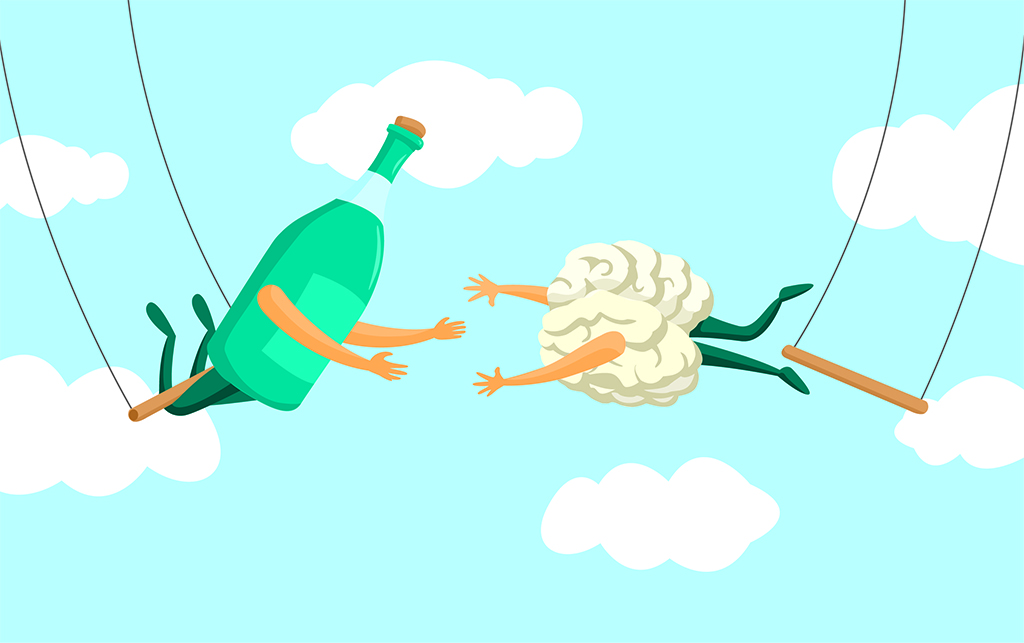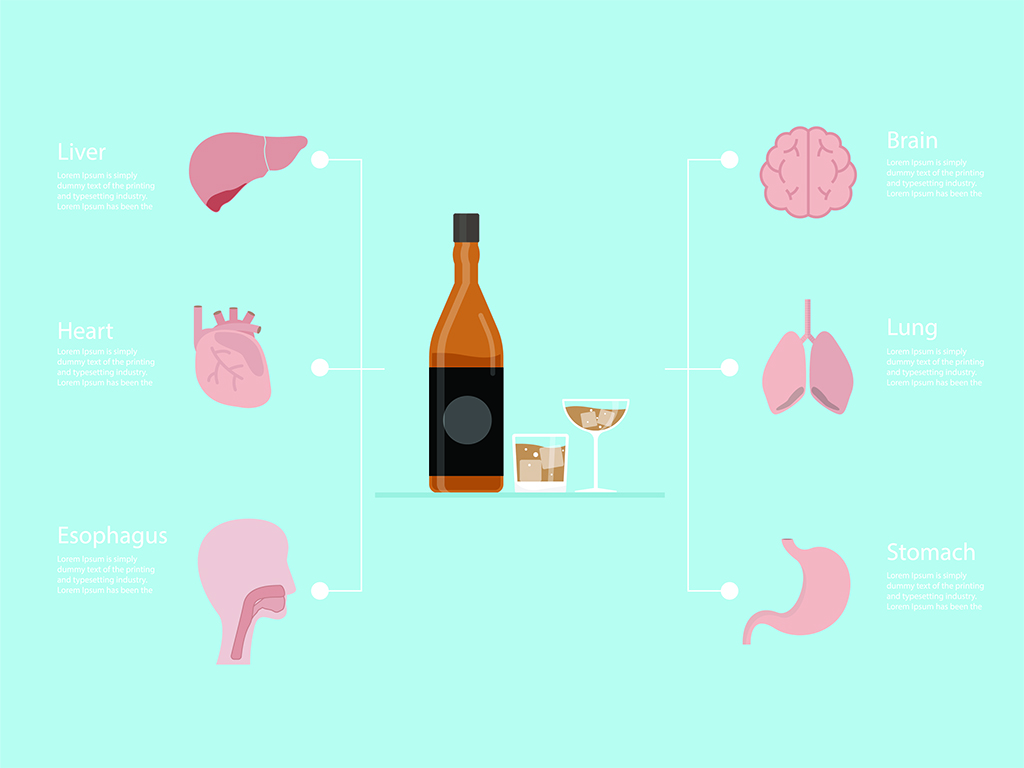Changing your drinking habits can be a challenge. Here’s what to expect when you eliminate alcohol.
- Although each person’s alcohol withdrawal timeline is different, it typically takes 7-10 days to complete detox
- Because alcohol withdrawal symptoms can be severe, it’s important to detox under supervised medical care
- The length of time it takes to detox depends on a few factors, including your age and whether or not you use other drugs.
Alcohol can be highly addictive. Unfortunately, it can also be hard to avoid. Not only is alcohol completely legal for anyone over the age of 21, but it’s also readily available at places many people visit everyday, like grocery stores and gas stations.
Although most people can consume alcohol without any issues, heavy ongoing drinking or occasional binge drinking can lead to a problem. For people who may be genetically predisposed to addiction, even moderate drinking can lead to dependence.
For anyone who drinks regularly, alcohol is linked to severe withdrawal symptoms. Mild cases include headache, rapid heart beat, nausea and tremors. In more serious cases, you may see high blood pressure, hallucinations, or even seizures.
If you or a loved one has struggled with alcohol withdrawal, you might wonder how long it can take before withdrawal symptoms subside. This guide will help you understand how drinking affects the mind and body, how to find effective treatment, and what you can expect along the alcohol withdrawal timeline.
Have questions about alcohol addiction?
Call us at 855-430-9426 to speak with a recovery specialist.
How Alcohol Affects Your Brain

Although you may not be conscious of it when you’re having a beer with friends or a glass of wine with dinner, alcohol can have a significant impact on your mind and body. Within approximately 30 seconds of taking your first sip, alcohol enters the bloodstream and makes its way to your brain.
Once there, the chemicals and pathways that send messages between cells in your brain slow down. Your mood alters, your reflexes diminish, and your balance is compromised. Alcohol can even affect memory formation, causing you to forget what you did while intoxicated. Alcohol also alters your dopamine levels, creating a pleasurable sensation. When you drink regularly, your brain adapts to those higher dopamine levels and slows your natural dopamine production, leaving you at a deficit when alcohol leaves your system. This is what leads to alcohol cravings.
Heavy drinking over a long period can also cause physical changes to your brain. The cells begin to shrink, causing the brain itself to get smaller. This leads to a long-term impact on cognitive ability, affecting how you learn, think, and form memories. You may even have trouble maintaining a normal and steady body temperature or controlling your movements.
How Alcohol Affects Your Body

As you consume alcohol, your stomach begins producing more acid to aid digestion. But, as the acid builds up and causes irritation, nausea can occur and can cause you to vomit. Alcohol causes the muscles in the esophagus to relax as well, which can lead to heartburn. The small intestine and colon may also become irritated. Alcohol slows the movement of food through the intestines, which can lead to diarrhea.
Increased urination is also common after consuming alcohol. The kidneys aren’t getting the signal to create urine at a reasonable level, and they go into overdrive. Urinating more often can lead to dehydration.
Liver
The liver is largely responsible for breaking down the alcohol, ridding the body of toxins. While a healthy liver can handle a moderation level of alcohol consumption, heavy drinking can lead to damage. The liver becomes thicker and fattier, due to a build-up of fibrous tissue. Blood flow is restricted, damaging the liver cells. Scars can develop and the liver stops functioning properly, a condition known as cirrhosis.
Pancreas
Along the way, the pancreas also suffers. It can become inflamed, leading to damage. Since the pancreas creates insulin, long-term alcohol abuse can diminish the amount produced by the body, potentially leading to diabetes. You also become more likely to develop pancreatic cancer.
Stomach
Additionally, heavy drinking can lead to the creation of ulcers in the stomach, a painful condition. The higher level of digestive juices may also diminish hunger, making it less likely that you’ll consume all of the food (and nutrients) you need to stay healthy. Further, the kidneys can get overworked, and the toxic effects can result in kidney damage.
Heart
Binge drinking frequently can lead to permanent changes in your heart rhythm. Essentially, the alcohol disrupts the normal electrical signals, wearing out the heart and, over time, causing the muscles to stretch and droop. At that point, it affects the heart’s ability to pump blood, harming every part of your body in the process.
What Happens During Alcohol Withdrawal
Given the severe impact that alcohol can have on the body, curbing your use is a good first step toward regaining your physical and mental health. Unfortunately, many regular drinkers find themselves affected by withdrawal symptoms, which can derail even the greatest intentions to reduce alcohol consumption. Withdrawal symptoms can include:
- Anxiety
- Nausea
- Vomiting
- Abdominal Pain
- Change in Appetite
- Fatigue
- Tremors
- Cognitive Changes
- Mood Swings or Disturbances
- Heart Palpitations or Irregular Heartbeat
- Blood Pressure Increases
- Changes in Body Temperature or Sweating
- Changes in Respiration
- Confusion
- Hallucinations
- Fever
- Seizures
Symptoms vary by person. A history of alcohol and drug use plays a role, as does the presence of any other medical conditions or co-occurring mental health disorders. The more dependent you become on alcohol, the worse your symptoms tend to be. Since withdrawal symptoms can be quite serious and unpredictable, it’s important to seek professional treatment when attempting to detox from alcohol, particularly if you have a long history of use.
Have questions about addiction?
Call us at 855-430-9426 to speak with a recovery specialist.
Alcohol Withdrawal Timeline
Your alcohol withdrawal timeline depends on a number of factors, including your age and drug use. On average, alcohol detox takes 7 to 10 days. However, some people may experience symptoms for longer, up to several months.
6 to 24 Hours
The first stage of withdrawal begins within 6 to 24 hours without alcohol. Symptoms usually start with minor tremors in the hands. Anxiety levels typically rise and the person may have trouble sleeping. Stomach discomfort and loss of appetite are also common, along with headaches, sweating, and nausea or vomiting. Mood swings, heart palpitations and an inability to think clearly also occur in the early stages.
24 to 72 Hours
Initial symptoms typically peak within 24 to 72 hours. At this point, new symptoms can arise. Irritability is common, and blood pressure often rises. Some people experience mental confusion or even hallucinations. Others may experience more serious and potentially deadly issues during this stage. Delirium tremens may also set in, making it difficult for the person to separate fantasy from reality. Seizures and cardiac arrest can also occur, both of which can be fatal.
By days 5 to 7, symptoms tend to taper off. However, some may continue for several weeks.
Getting Treatment for Alcohol Withdrawal
If you struggle with alcohol dependence, it’s important to seek medical guidance to ensure that your withdrawal symptoms are appropriately overseen and addressed. This is especially true if you have a co-occurring disorder, struggle with anxiety or depression, or may become suicidal.
An inpatient treatment center is typically the best option to treat alcohol withdrawal. There, you’ll receive 24/7 care and support from medical professionals who can carefully monitor your condition. These programs also include addiction education, counseling resources, group therapy, and referrals to local programs that can offer ongoing support once you leave treatment. At a treatment center, you may also have access to medications that can reduce cravings and make your symptoms more manageable.
Once you complete treatment, it’s important to continue your recovery. This can include participating in 12-step programs, attending cognitive behavioral therapy sessions, and seeing a medical doctor who can manage any existing or resulting health conditions.
Freedom from alcohol dependence — and accompanying withdrawal symptoms — requires a long-term commitment to your self-care and well-being. In that sense, even though the alcohol withdrawal timeline might be days or weeks, your recovery will be an ongoing process.
If you or a loved one is struggling with alcohol dependence, help is just a call away. Call the number below to speak with an experienced clinician about how to start your recovery.
Have questions about addiction?Chat with one of our recovery specialists now.